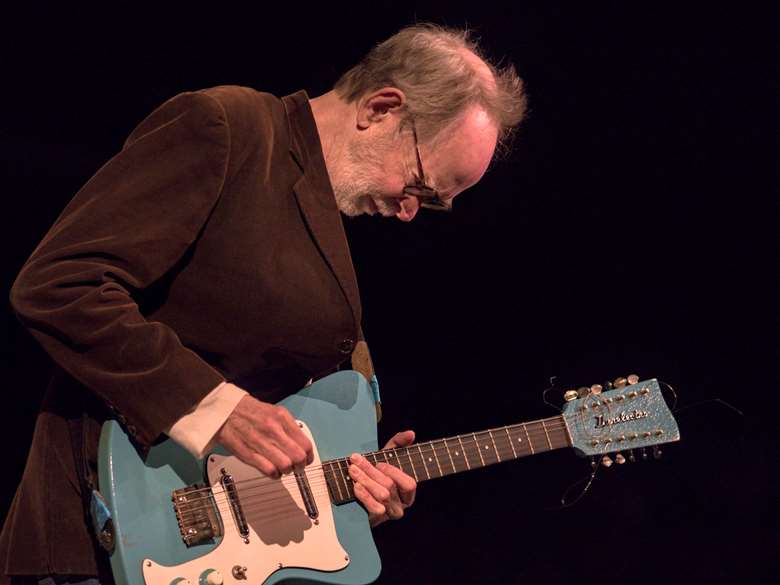Live Review: Moers Festival
Martin Longley
Thursday, August 8, 2024
The four-dayer Moers Festival hits its 53rd edition, not far from Cologne, resonating with the wayward sonics of Zeena Parkins, Conny Bauer and Arto Lindsay. Martin Longley strode around its oval site, from darkened indoor hangar to outdoor hippy scene, from music school to makeshift free improvisation stage…

Photo: Nicephore Sax
Although the programme of this 53rd Moers Festival was awash with performances, dynamically crowded as ever, there was a paucity of what would be considered well-established acts present. In recent years, mainline jazzers such as David Murray, John Scofield, Kenny Garrett and Billy Hart have played, at a time when the festival was pointing out that it’s never had the word ‘jazz’ in its title. Now, as Moers is (jokingly, as ever) acknowledging its swing factor, acts are heavy on the rock, noise, electronic and freely improvised fronts. Who knows what lurks in the mercurial Moers mind? There even seemed to be less modern composed music this year, while the festival focus lay on artists from Japan and Namibia. The former mostly offered extreme free music and twisting rock, but the aura from Namibia was of a mainstream neo-soul hue. Your scribe can dissect the conceptual details, but what remains is an unexpectedly high quota of emergency spontaneity and extreme shotgun marriages of genres.
The British duo of Alexander Hawkins (keyboards) and Neil Charles (bass) joined up with a pair of Germans, Julia Brüssel (violin) and Emily Wittbrott (cello), their instrumentation instantly dividing the sound into jazz and classical characters, joined by the spirit of improvisation. Pizzicato strings and full bodied bass trod lightly as Hawkins became the dominant player for much of the set, in terms of radical structural repetition and flyaway abstraction. His prepared piano metal-vibration was rhythmically winding, as the violin developed a sweeping sourness. Hawkins hammered doggedly, minimalism gone hardcore, his pointillist explorations turning into a scamper.
Skylla really benefited from the debut presence of drummer Max Andrzejewski, who sounded like he’d been born into the band. He provided just what they might have needed, hooking up tightly with Ruth Goller’s increasingly more raw (and intricate) electric bass. The three voices navigate the surrounding ether, combining abstraction and exactitude. Andrzejewski’s kit is augmented by a heap of gongs, woodblocks and small metal trinkets, lending detail to the complex rocking out.
The Moers Sessions have long provided semi-spontaneous line-ups for instant creation, usually at 11am, but on this first evening happening at 9.45pm, with local trombonist Shannon Barnett steadily establishing herself as a significant presence on the Cologne scene, firstly with composed thematic pieces, and now via free improvisation. She’s adept in both zones, joined by vibraphonist Taiko Saito.
For the last few years the Annex stage has provided an even looser platform, with team-up combinations coming together mere hours prior, and often subject to sudden change. In 2024 the set-up is now particularly mixed-up, as the Sessions and Annex sets largely took place on the same courtyard stage.
Alto saxophonist Jan Klare governs the Moers Sessions, but he also unveiled his heavily composed Kind combo, gaining the award for the speediest accuracy and skating slipperiness of the entire festival. His high-wire horn arrangements forced cheek-wide grinning. Klare shaped clarinet, trombone (Barnett again!), cello, bass and drums, like a slapstick soundtrack, cartwheeling as high art. ‘Six Exits, One Key’ is a regal parade, although a touch twitchy, while ‘Zero Brain, Twelve Hands’ hurtles from frantic skip to sullen shuffle.
The veteran New York harpist Zeena Parkins found similarities with Japanese koto player Michiyo Yagi, using mallets and digital effects, traditional sounds beside electrical interference. Parkins applies a bow for industrial harshness, but she can also pluck diaphanously.
The veteran Cologne trombonist Conny Bauer kept himself well-behaved when partnering the Japanese pianist Rieko Okuda, who operates with a softer classical articulation. No rasping outbreaks for Bauer! Okuda moves under her lid, dampening strings, percussively prancing while the ‘bone slides up and down, rhythmically. Bauer cuts into a speed-dancing line while Okuda wanders cerebrally.
The Monday Moers Session began the day with Dutch wildman guitarist Jasper Stadhouders spontaneously turning up in Moers to join a few of the improvising groups. Here was one that featured Yuki Byeol, a Japanese dancer who presented some of the most original, responsive and expressive moves ever witnessed as an accompaniment to free improvisation. Body poppin’, jazz dancing and ritual twitching. She was so well-versed that she almost seemed to anticipate what might be sprung from the players.
A few hours later, Annex courted a ‘supergroup’ of improvisers (pictured below): Conny Bauer (trombone), Bart Maris (trumpet), Jan Klare (alto saxophone),Wilbert de Joode (bass) and Michael Vatcher (drums). They were presumably free-forming, but the short-ish tunes sounded like densely-penned themes, with brief solo flurries for all. All of these were micro-grained with powdery textures. Vatcher drummed delicately as Bauer formed a trio within the band, nimbly sliding, the other horns creeping in, and the swarm intensifying. Vatcher used a bowed saw, with these detailed events like coordinated accidents, from fruity ‘bone to brittle trumpet muting, de Joode keeping it mobile and sparse.

This could only be topped by the full noise orgy of a gathering that included Stadhouders, Farida Amadou(electric bass) and Virginia Genta (tenor saxophone), a blow-out and a blow-up, full-on rage from the outset, monstrously amplified guitars and even effected tenor bleeding into a monolithic wall of distortion, a fortress of absolute excess.
Following this, for a quiet climax, we could hear Arto Lindsay in the cavernous Eventhalle, making a song combination out of his two main strands: fragile Brazilian vocals and savagely abstract guitar, usually within the same song. No one else can make these qualities co-exist so harmoniously, as silken bossa nova gets an icepick in its forehead, repeatedly.